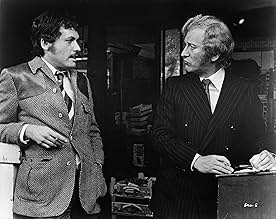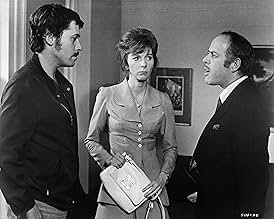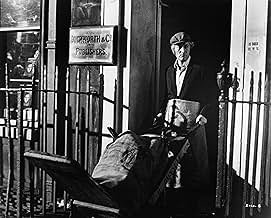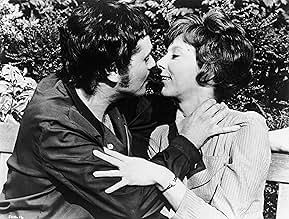Un asesino en serie estrangula a mujeres y el hombre del que sospecha la policía de Londres es el tipo equivocado.Un asesino en serie estrangula a mujeres y el hombre del que sospecha la policía de Londres es el tipo equivocado.Un asesino en serie estrangula a mujeres y el hombre del que sospecha la policía de Londres es el tipo equivocado.
- Dirección
- Guionistas
- Elenco
- Premios
- 3 premios ganados y 8 nominaciones en total
- Dirección
- Guionistas
- Todo el elenco y el equipo
- Producción, taquilla y más en IMDbPro
Opiniones destacadas
After the poorly received Torn Curtain and Topaz, Hitchcock returned home to both the murder genre and to Covent Gardens in London to film Frenzy, a lurid tale of a serial killer and the man caught up as the prime suspect. The only feeling of new from the film comes from the use of nudity and a particular focus on the real killer, and yet it's still a solidly built thriller, the sort of thing that Hitchcock could seemingly do in his sleep.
There's a killer on the loose in London, and he has a trademark in that he rapes his female victims and then strangles them with a necktie. In the city is Dick, a former RAF pilot who's had a hard time of it since he left the service, going from job to job and recently divorced. He starts the movie by taking a drink from the pub where he works and immediately getting fired despite his protestations, and the support of his girlfriend Babs, that he was going to pay for it. Without a job, Dick goes to his ex-wife for some kind of support, which he gets through dinner and twenty pounds that she slips into his pocket without his knowledge.
Later, Dick's friend Rusk shows up to Dick's wife's office, a matchmaking service, and demonstrates for the audience, in rather shocking detail, how he is the necktie killer. Now, the reveal of the identity of the serial killer is an interesting twist on the genre. We see Dick and Rusk interacting at several points, events that tell the audience of the danger Dick is putting himself into while he doesn't realize it himself. It's a new version of the tried and true method of creating tension. The other interesting thing about the early reveal is that about half of the movie is from Rusk's own perspective, including the movie's best single sequence.
Rusk has murdered another girl and shoved her body into a potato sack onto a truck. As he returns to his apartment, he realizes that he's lost his pin and that the girl had grabbed onto it. He needs to get back to the body and retrieve the pin, but as he's hiding in the back of the truck, the driver comes and drives off. Rusk has to negotiate the logistics of hiding in the back of a potato truck while digging out a corpse, breaking the fingers on the right hand because of rigor mortis, retrieving the pin, and then getting out again. I can imagine Hitchcock laughing himself silly as he conceived of the scene (not shooting, it seemed like a nightmare to shoot). It's such a twist on the sort of sequence where the bad guy, who's already done the bad dead, is trying to get out of trouble, and the filmmaking is so effective that the audience is along with him, not really cheering him on, but instinctively sharing the same concerns as him.
Another wonderfully amusing aspect of the film, which feels a little disassociated from the rest and gives some pause in terms of praise, is the chief inspector on the case and his wife. The film uses two dinners as springboards for the inspector to explain the police's position at two different points in the film, and instead of just straight exposition the scenes are played out as the wife brings out the most bizarre dishes that look completely inedible. However, since the police inspector is such a polite British man of good manners, he finds ways to get around eating the food he obviously has great distaste for, one of which made my wife cringe audibly as he did it. They're two of the most purely entertaining scenes of exposition in Hitchcock's filmography.
So, yeah, I like it. I do feel like it's a return to form after Topaz, though I seem to like Torn Curtain more than most so it's not like some sort of great gap of quality. One of the drawbacks of the film's approach to treating the two characters, the criminal and the falsely accused, with equal measure is that they end up a bit thinner than they otherwise could be. Dick, in particular, feels like a generic Hitchcock protagonist rather than a strongly written character, especially after the first act when the focus on the actual crimes gets taken up.
It's a gripping little murder thriller set in Alfred Hitchcock's old stomping grounds with some wonderful sequences. It seems to have been a bit overpraised contemporaneously, but that doesn't detract from the fact that it's still a solidly good film.
There's a killer on the loose in London, and he has a trademark in that he rapes his female victims and then strangles them with a necktie. In the city is Dick, a former RAF pilot who's had a hard time of it since he left the service, going from job to job and recently divorced. He starts the movie by taking a drink from the pub where he works and immediately getting fired despite his protestations, and the support of his girlfriend Babs, that he was going to pay for it. Without a job, Dick goes to his ex-wife for some kind of support, which he gets through dinner and twenty pounds that she slips into his pocket without his knowledge.
Later, Dick's friend Rusk shows up to Dick's wife's office, a matchmaking service, and demonstrates for the audience, in rather shocking detail, how he is the necktie killer. Now, the reveal of the identity of the serial killer is an interesting twist on the genre. We see Dick and Rusk interacting at several points, events that tell the audience of the danger Dick is putting himself into while he doesn't realize it himself. It's a new version of the tried and true method of creating tension. The other interesting thing about the early reveal is that about half of the movie is from Rusk's own perspective, including the movie's best single sequence.
Rusk has murdered another girl and shoved her body into a potato sack onto a truck. As he returns to his apartment, he realizes that he's lost his pin and that the girl had grabbed onto it. He needs to get back to the body and retrieve the pin, but as he's hiding in the back of the truck, the driver comes and drives off. Rusk has to negotiate the logistics of hiding in the back of a potato truck while digging out a corpse, breaking the fingers on the right hand because of rigor mortis, retrieving the pin, and then getting out again. I can imagine Hitchcock laughing himself silly as he conceived of the scene (not shooting, it seemed like a nightmare to shoot). It's such a twist on the sort of sequence where the bad guy, who's already done the bad dead, is trying to get out of trouble, and the filmmaking is so effective that the audience is along with him, not really cheering him on, but instinctively sharing the same concerns as him.
Another wonderfully amusing aspect of the film, which feels a little disassociated from the rest and gives some pause in terms of praise, is the chief inspector on the case and his wife. The film uses two dinners as springboards for the inspector to explain the police's position at two different points in the film, and instead of just straight exposition the scenes are played out as the wife brings out the most bizarre dishes that look completely inedible. However, since the police inspector is such a polite British man of good manners, he finds ways to get around eating the food he obviously has great distaste for, one of which made my wife cringe audibly as he did it. They're two of the most purely entertaining scenes of exposition in Hitchcock's filmography.
So, yeah, I like it. I do feel like it's a return to form after Topaz, though I seem to like Torn Curtain more than most so it's not like some sort of great gap of quality. One of the drawbacks of the film's approach to treating the two characters, the criminal and the falsely accused, with equal measure is that they end up a bit thinner than they otherwise could be. Dick, in particular, feels like a generic Hitchcock protagonist rather than a strongly written character, especially after the first act when the focus on the actual crimes gets taken up.
It's a gripping little murder thriller set in Alfred Hitchcock's old stomping grounds with some wonderful sequences. It seems to have been a bit overpraised contemporaneously, but that doesn't detract from the fact that it's still a solidly good film.
A good return to form for the master of suspense, Alfred Hitchcock. Since The Birds in 1963 Hitchcock's movies (Marnie, Torn Curtain and Topaz) had not met with commercial success (though, personally, I think Marnie was great).
Frenzy sees Hitchcock back to doing what he does best - suspenseful murder dramas. Great, intriguing plot with the usual clever direction from Hitchcock. Some of his camera angles and exterior shots are straight from his own book of how imply something and create tension without saying a word, or using manipulative music.
The movie also has some great comedic moments. The Chief Inspector and his wife having dinner were always hilarious.
Much more edgy in terms of nudity and sex than any previous Hitchcock movies. This could be ascribed to censorship restrictions being relaxed. Also tells you what Hitchcock could have done with is movies if all the stupid, puritanical censorship wasn't there all along.
Not as tightly wound as his greats (Rear Window and Psycho especially), so not perfect as far as suspense and enthrallment goes.
Good performance by Jon Finch in the lead role. Good support from Alec McCowen, Barry Foster, Anna Massey and Barbara Leigh-Hunt.
Sadly, this was to be Hitchcock's penultimate movie. His final movie, Family Plot was released four years later, in 1976. He died in 1980.
Frenzy sees Hitchcock back to doing what he does best - suspenseful murder dramas. Great, intriguing plot with the usual clever direction from Hitchcock. Some of his camera angles and exterior shots are straight from his own book of how imply something and create tension without saying a word, or using manipulative music.
The movie also has some great comedic moments. The Chief Inspector and his wife having dinner were always hilarious.
Much more edgy in terms of nudity and sex than any previous Hitchcock movies. This could be ascribed to censorship restrictions being relaxed. Also tells you what Hitchcock could have done with is movies if all the stupid, puritanical censorship wasn't there all along.
Not as tightly wound as his greats (Rear Window and Psycho especially), so not perfect as far as suspense and enthrallment goes.
Good performance by Jon Finch in the lead role. Good support from Alec McCowen, Barry Foster, Anna Massey and Barbara Leigh-Hunt.
Sadly, this was to be Hitchcock's penultimate movie. His final movie, Family Plot was released four years later, in 1976. He died in 1980.
Hitchcock back in his native land concocting a classic British thriller with a large dose of humor and cruelty. Jon Finch plays the innocent man on the run. Jon Finch ! He was Polanski's Macbeth. A great but uncomfortable presence on the screen. I can't quite explain it. The first time I saw him was in a small but pungent scene as a hustler in John Schlesinger's Sunday Bloody Sunday. In Frenzy he falls in several traps, as a character and as an actor. He doesn't have the lightness nor the charm of a Cary Grant but he has a weight of his own that makes Frenzy truly dark. Anna Massey plays the girlfriend, a part that, apparently, was offered to Helen Mirren in 1972 but she turned down, as a young actress she had her eyes set on Jack Nicholson for instance, feeling that Hitchcock was old hat. Maybe she was right, but I wonder if she regrets it. Billie Whitelew is also in the cast plus Alec McCowen as the Inspector from Scotland Yard and Vivien Merchant as his wife in a delicious Hitchcokian touch. If you're a Hitchcock fan I'm sure you've seen it but if you haven't, you must.
This. This is more like it. After the last few Hitchcock films left me wanting a little, FRENZY returns to the type of film that he did so well. The plot is one that he frequently used: an innocent man wrongly accused, but he didn't just rehash old material. He upped his game and brought his filmmaking style into a more modern sensibility, all while maintaining the suspense and black humor that had become his trademarks. While I've yet to see any of the films from his British period, I am aware that FRENZY hearkens back to his first real success, which was THE LODGER. And in terms of what I've actually seen, I noticed a lot of DNA from earlier efforts like SABOTEUR, REAR WINDOW, and PSYCHO. The film grabs you and sucks you in from the opening notes of its title sequence, a fanfare which triumphantly announces that he's back: back in his native England, and back in top form. And it wastes no time in thrusting you into this familiar, yet slightly changed world. One thing that benefits the film a lot is the screenplay by Anthony Shaffer, which is filled with great dialogue and biting wit. There was also a sinister, Victorian elegance to the score. And, as with all of his other films, there are a few sequences which stand out. The best of these is probably a long, continuous shot which pulls back from the scene of a crime as Hitchcock leaves it (and its aftermath) to the audience's imagination. Still, perhaps in concession to the changing times, this film does contain some nude scenes and somewhat more vicious-minded, if not particularly graphic, violence. It reminds us that the gory details are often best left to the imagination; they're the icing on the cake, and not the cake itself. Another audacious thing Hitchcock does is make the protagonist rather unlikeable and have us sympathize (at least in one protracted scene) with the villain. Overall, I thought that he was in top form here, adeptly mixing suspense and comedy, all while exploring his favorite themes of sex, death, and food. In regards to food, the Chief Inspector's wife has perhaps a couple of the funniest scenes in the whole film. For me, FRENZY was a welcome return to form after the last few misfires, and it's great that Hitch seems to be going out on top.
The grand man of suspense, Alfred Hitchcock, directs this dark film about a man that kills women with neckties with relish, aplomb, and an atypical grimness. The story is typical Hitch as an innocent man is pushed into a world of intrigue around him as everyone believes him to be the necktie killer. Jon Finch plays the innocent with earnestness and is quite good in his role. The rest of the cast is very effective as well. Hithcock, however, is the real star with his camera. Although much of the film is nothing more than tried and true material, Alfred Hitchcock makes the mundane spectacular with his camera and some great shots and spaces of silence. The scene where a girl coming back from lunch is awesome as we the audience are made to wait what seems an eternity for her to discover what has taken place since she left. The scene of the camera moving in and out of the house of the killer is also wonderful, as is the scene with the killer in the potato truck. That scene is easily the most suspenseful of the entire film. The film is particularly dark for Hitchcock as a women is raped rather abruptly(for lack of a better word) showing naked breasts and genuine terror. To counter-balance the more lurid aspects of the film is a subplot story of a police inspector, played with charm by Alec McCowen, whose wife constantly feeds him nothing but gourmet meals that sound and look quite horrible! These scenes are so funny and charming! A good thriller from the master of suspense!
¿Sabías que…?
- TriviaAlfred Hitchcock's daughter Patricia Hitchcock found this movie so disturbing that she would not allow her children to see it for many years.
- ErroresWhen examining the murder scene at the marriage bureau, a police officer brings the victim's handbag out to Inspector Oxford, who correctly holds it with a handkerchief to keep his fingerprints from contaminating the evidence. He then he sticks his ungloved hand inside and feels around, thus contaminating it with his own fingerprints.
- Citas
[last lines]
Chief Inspector Oxford: Mr. Rusk, you're not wearing your tie.
[Robert Rusk is speechless for a moment]
Robert Rusk: I...
[he drops the trunk that he has just dragged into the room]
- Créditos curiososThe Universal Pictures logo does not appear on this film.
- Versiones alternativasThe original UK cinema and initial 1989 CIC video releases were cut by 19 secs by the BBFC to remove shots of underwear removal and closeups of neck strangling from the murder scene. The cuts were restored in all later Universal video and DVD releases.
- ConexionesFeatured in The Dick Cavett Show: Alfred Hitchcock (1972)
Selecciones populares
Inicia sesión para calificar y agrega a la lista de videos para obtener recomendaciones personalizadas
Everything New on Netflix in June
Everything New on Netflix in June
No need to waste time endlessly scrolling — here's the entire lineup of new movies and TV shows streaming on Netflix this month.
- How long is Frenzy?Con tecnología de Alexa
Detalles
- Fecha de lanzamiento
- País de origen
- Idioma
- También se conoce como
- Frenzy
- Locaciones de filmación
- The Globe pub, Bow Street, Covent Garden, Londres, Inglaterra, Reino Unido(pub where Blaney, Babs and Forsythe work)
- Productora
- Ver más créditos de la compañía en IMDbPro
Taquilla
- Presupuesto
- USD 2,000,000 (estimado)
- Total a nivel mundial
- USD 4,940
- Tiempo de ejecución1 hora 56 minutos
- Relación de aspecto
- 1.85 : 1
Contribuir a esta página
Sugiere una edición o agrega el contenido que falta

Principales brechas de datos
By what name was Frenesí (1972) officially released in India in English?
Responda



































